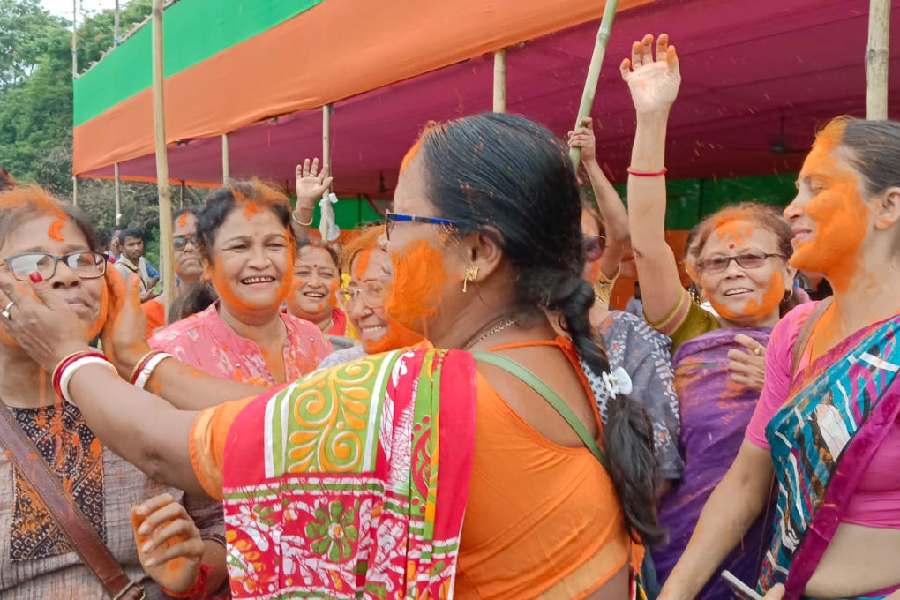The BJP's thrust on the citizenship matrix, which was implemented by the Centre merely a month before the Lok Sabha polls, did not give the desired mileage as the winning margins of the party's candidates in three major Matua-dominated constituencies — Ranaghat, Bongaon and Jalpaiguri — dropped this time compared to the 2019 figures.
In 2019, Matuas, who form around 35 per cent of the electorate in these constituencies, have shown a clear leaning towards the BJP as the community members supported the party convinced by its citizenship promise and ensured its victory.
In Bongaon, which has the maximum number of Matuas, BJP candidate Shantanu Thakur defeated Trinamool's Mamatabala Thakur by 1.11lakh votes in 2019. But this time Shantanu's winning margin dropped to 73,693.
In Ranaghat, BJP candidate Jagannath Sarkar defeated Trinamool's Rupali Biswas in 2019 by a margin of 2,33,428 votes. Sarkar's vote share was 52.75 per cent. But Tuesday's result showed that his margin was 46,529 votes less than what he got . last time. Though his victory margin of 1,86,899 votes gave him a vote share of 50.78 per cent votes, the loss of nearly 50,000 votes in a Matua bastion is significant.
Sarkar defeated Trinamool's Mukutmani Adhikari, who switched sides in the run-up to the polls.
Similarly in Jalpaiguri, BJP candidate Jayanta Roy's margin dropped by 97,311 votes in comparison to 2019. Pro-BJP Matua leaders attributed fall in the margin to the confusion over the CAA provisions and at the same time to the lack of initiatives of the top BJP leadership to help people overcome fear and apprehensions particularly to counter the Trinamool's narrative.
"CAA provisions have definitely benefited the BJP as it kept its promise. But at the same time, the party leadership should have been more active in helping people overcome confusion due to the lack of clarity in the legal provisions. It appears, apprehensive about the outcome, many community members did not vote for the BJP," said Mahitosh Baidya, secretary of pro-BJP All India Matua Mahasangha.
"Trinamool was successful in creating doubts in the minds of Matuas," he added
The confusion and lack of clarity in the provisions of the rules appeared to have made an impact among voters and Trinamool’s narrative against the Citizenship Act also played a spoil-sport.
BJP MP Shantanu Thakur refused to speak about any lack of clarity.
"We requested the MHA for simplification of the provisions, which will change the situation", he said. Thakur, however, refused to identify the lack of clarity and confusion in CAA rules as the reason behind the fall in his winning margin
"Despite Trinamool's concerted campaign against CAA, we have done better than the 2021 Assembly polls," he added.
The confusion has increased post-poll as the BJP has failed to get enough MPs to form the government on its own. If BJP forms the government, Narendra Modi will be largely dependent on NDA partners. Some of Modi's allies were not on the same page regarding CAA and a large section of the Matuas has become apprehensive about how the new government will handle the implementation of the citizenship matrix.
"BJP will not be in a position to implement any bill like the CAA without taking the consent of its partners. It will be difficult for the BJP to convince the people to apply for citizenship now," Mukul Bairagya, the chairman of West Bengal Namashudra Development Board, said.
"There are around 2.87 crore residents belonging to the Namashudra community, a section of whom are known as Matuas. Only around a dozen people applied for citizenship ahead of the LS polls. But after considering the result, it seems nobody from the community will apply," Bairagya said.
Matuas — one of the most sought-after voters after Muslims in the state — constitutes about 35 per cent of the electorate in Bongaon and Ranaghat. The Matuas are also settled in Jalpaiguri Krishnanagar, Burdwan-East and in pockets of constituencies like Barasat, Alipurduar, Joynagar, and Raiganj.










